Karen Sturm
Erasmus: University of Surrey

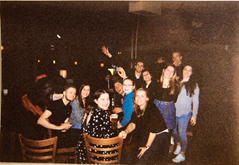
I did my Erasmus at the University of Surrey from September 2018 until February 2019. My choice was definitely influenced by Brexit because I knew that future long-term stays would be more difficult.
Participating in the Erasmus programme was a highlight during my time at university. Studying abroad was an amazing opportunity, but what made it so much more memorable was the students you meet from all over Europe and the rest of the world. We were quite a big group of exchange students and there was hardly a weekend where we didn’t get together, for potlucks or movie nights. In a way, I was not only able to experience being a uni student in the UK, but I also learned so much about what studying is like in Italy, Spain, Austria and France. It is true that exchange students tend to stick to themselves and create an exchange bubble, but there was still a lot of interaction with local students and events where everyone went and mingled. Brexit has been very present throughout my studies. When I started my bachelor in European Studies, the UK decided to leave the EU, and now during my master in European Public Affairs the UK has finalised its decision and has left the EU.
I would say that my time in Surrey was a bit of a breather from a very pro-EU bubble in Maastricht. Although I enjoy my studies and want to try and build a career around the EU and Brussels, there was something refreshing about having more critical views on the EU.
However, if there is one thing that I have learned during my Erasmus, aside from drinking like the English, dancing like the Spanish, eating like the Italians, is that we’re better and stronger together. As a German studying in the Netherlands, who enjoys drinking Belgian beers and breaking German bread, I believe that the EU has given me a lot of great opportunities and want to ensure that future generations can enjoy them just as much, if not more.
Lorène Weber
Erasmus: London Metropolitan University
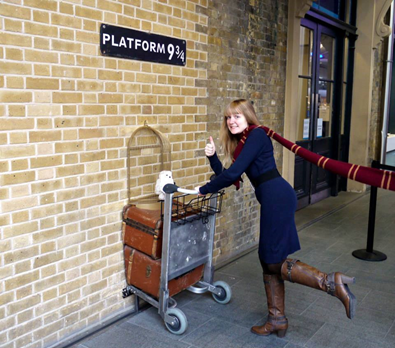

I had the fantastic opportunity to spend my Erasmus in London and to benefit from an Erasmus scholarship in 2013-2014. I was 20 years old and I studied Politics & International Relations at London Metropolitan University, which was a very welcoming, inclusive, and international uni, with excellent professors.
My Erasmus was when I first studied EU politics and functioning and became passionate about it. I can safely say that my Erasmus had a decisive impact on my later academic and professional path in European affairs. Beyond the field of study, discovering the British higher education system was also enlightening. The way of teaching, the kind of assignments we were given, or the interactions between students and professors were refreshing, more interactive, and inclusive than what I had been used to. I would say that the British system favours one’s own research and taking of initiatives, and provides more opportunities for debate than the French system does – at least from my undergraduate experience at the time. It shows that Erasmus provides opportunities to reflect on one’s own country system, to learn from others, to open your mind, and to progress – which is the whole point of benefiting from an experience abroad.
My Erasmus was also when I first felt European. I was immersed in a vibrant, international, and multicultural European capital, where I met people from all over Europe – and beyond. Speaking another language than French and talking to people coming from so many different countries and horizons was a breath of fresh air. It was the time when I first really grasped both what unites us as Europeans and what we can learn from one another. I learned a lot culturally speaking, but also grew as a person and as a European.
I have no words that are strong enough to describe how much of a waste, how disgraceful, how narrow-minded and how insulting for young generations, the UK government’s decision of no longer being part of the Erasmus scheme is. The government of the Republic of Ireland limited the damage by announcing that it would fund the Erasmus scheme for Northern Irish students, but for Scottish, Welsh and English citizens, this is a shameful loss, depriving young people from a potentially life-changing experience and from widening their horizons and opportunities.
However, to end on a brighter note, I still feel confident that the UK will be back someday in the EU, regardless of how it will be back – the prospect of an independent Scotland and of a reunited Ireland being back in the block not looking unrealistic to me. The British younger generation has a lot of work ahead, and let’s hope that Europe will listen to them with a more sympathetic ear than Number 10.
Simon Grajer
Erasmus: Cardiff University

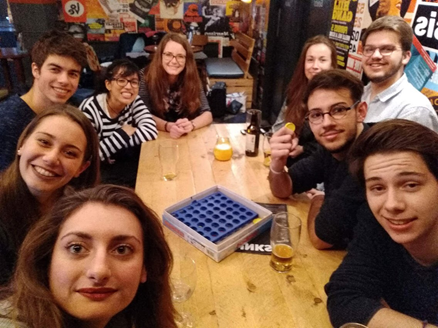
Applying for the Erasmus+ programme has probably been the best choice of my academic life (thanks to a special friend, who convinced me to do so!). Being accepted to the Erasmus scheme enabled me to fund studying abroad in the United Kingdom in the first place.
My participation in Erasmus+ gave me great experiences, wonderful memories and powerful life lessons. May they have been pleasant or unpleasant, either of academic or social nature, linguistically, culturally, politically or interpersonally, all of them are invaluable and enriching for me.
Erasmus+ gave me the chance to get to know the British system of higher education and its famous academic life. Not only did I get an insight into British and Welsh culture, life and ways of thinking, but I was also able to build unique friendships with students and scholars from countries all over Europe and beyond, as well as with locals who were open and welcoming to young foreign students.
Undoubtedly, these times already stood in the unfortunate light of Brexit, intensifying my Erasmus experiences in Wales, broadening my mind on British and many other diverse perspectives on the European Union and European political matters. Valuing the diversity of the people and their culture living in the UK, Europe and the world became a more prominent aspect for me. Most importantly, studying abroad within the Erasmus scheme strengthened my critical but strong position towards European solidarity and unity both rationally and emotionally.
The UK finally but sadly withdrew from the European Union in 2020 and decided to wrest this magnificent chance from the country’s young generation, who overwhelmingly voted in favour of “remain” within the Brexit-Referendum, and are now ironically hindered from making these experiences and benefitting from the European integration like I did.
The EU as well as the UK need to move on and find a way to bring the Kingdom back into the Erasmus scheme, or at least to find alternative solutions to bring British and European students back to mobility.
For auld lang syne, yet for a better future and “ever closer union”!
Katharina Klüber
Erasmus: University of York

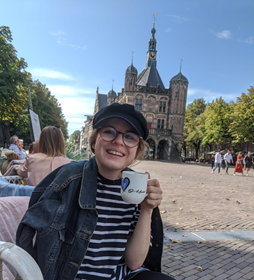
My name is Katharina and I am a German 22-year-old studying in the Netherlands. During my BA in European Studies in Maastricht, I spent one trimester, from September to December 2019, at the University of York. As the daughter of an English teacher, I grew up with a passionate enthusiasm for British culture. My love and curiosity for Great Britain, as well as the excellent universities in the country, encouraged me to spend my Erasmus in the UK. I do not regret this choice - particularly as this will unfortunately not be an option to future Erasmus students. Besides the medieval city of York being stunning, the university classes being incredibly interesting and the opportunity to participate in a Model United Nations conference, I learned a lot about Britishness and European identity.
During my stay, Brexit was postponed for the final time, from October 31, 2019 to January 31, 2020. After a chat over a cup of tea with one of my housemates about these developments, he thanked me for the conversation as it was, quote-on-quote “really interesting to talk about Brexit with a European”. To me and to some of the other Erasmus students I spoke to, it was outstanding that most of our British peers did not identify as European even though we, as ‘mainlanders’, considered them as Europeans all our lives. We wondered how these different perceptions arose. This change of perspective taught me a lot about Brexit and how it could have occurred as a consequence of identity differences. I would have not gained these insights without talking to my British peers.
Besides that, Northern England’s nature and cities are certainly underrated and the locals I came across were welcoming and inclusive. All of my housemates whom I lived with on Campus were British which made me feel like I am actually experiencing a bit of British student culture. I feel privileged to look back on fun pub nights and inspiring trips during my time in the UK. Besides a lot of fun and great food, the lessons I learned about Britishness and Brexit politics during a time, so shortly before the UK left the EU, are priceless. These learnings motivated me to learn more about Euroscepticism which I will focus on when writing my Master thesis this semester.
Christina Schläger-Herrero
Erasmus: University of Kent
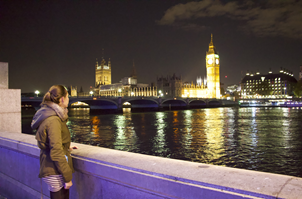
My name is Christina and I currently live in Germany. In 2016, I did my Erasmus semester in Canterbury. At the time, I decided to spend a semester abroad in the UK because, as a political science student, I wanted to get a personal insight about Brexit and the political movement behind it. Almost five years on, Brexit has become a reality.
I find it indescribably sad that the UK is no longer part of the EU and no longer participates in the Erasmus programme, simply because it doesn’t seem worthwhile to them and is just too expensive. Turing is the name of the new program where only Brits can study at continental European universities.
My stay in England gave me a comprehensive overview of the concerns and opinions of young and older Britons and why they voted for Brexit. Young Brits shared their worries about German power in the EU, due to what has happened in the past. That shocked me at the time, and after hearing that, it really made me think. I had not perceived this point of view before, so it was very interesting for me. German politics should become even more aware.
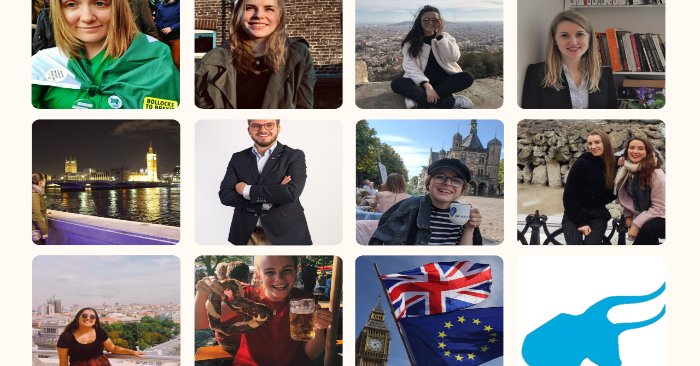


Follow the comments: |
|
